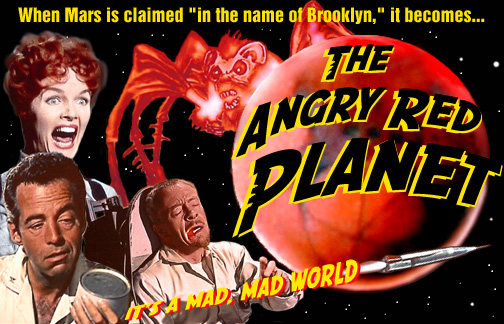
Hard to know what to say about this. Such attention to technical detail, but the detail's all fabricated technobabble. In a lot of ways I'd say this is the prototype for Mission to Mars, the way it has more excitement for its faux-verisimilitude than for its characterization or drama; the way it clumsily dumps an endless barrage of exposition and hokey sentiment into the mouths of every character; and the way the whole film treats Mars like a mysterious threat but in the end the Martian "message" is surprisingly humane and civilized -- though in Mission to Mars that message is an invitation to explore the cosmos, and here in The Angry Red Planet the message is a weirdly parental one, akin to "We've been watching you, and do as you like, but stay out of Mom and Dad's bedroom or you'll be in big trouble, mister."
Also like Mission to Mars, this was a story about a series of events, and the cast was basically filled out in a way that gave us what we needed to make the story work -- including what I have to say is the least realistic crew selection I've ever seen in an astronaut/space movie, like trying to split the difference between the useful archetype diversity of Gilligan's Island and the mutli-discipline scientific-family of Lost in Space. The characters here are too perfectly what is needed to tell this story, and never come off as interesting or believable. In fact, with his rugged kind-of-good looks and brutish masculinity, I gather Colonel O'Bannion is supposed to be a kind of knock-off Bogart, but he comes off more like a heavy. The "dark alley" flirtation between him and "Irish" is less sparky and more rapey. Professor Gettell and good-ol' working class Sam come off more like cartoonish caricatures than genuine people. But the film is 1959, and a b-movie sci-fi thriller, so I'm fully aware that I'm gauging it on unfair criteria.
There's something interesting to the story, definitely, but more in a proto-Star Trek way than anything useful. The exposition moves pleasantly fast, which is worth noting, but it's so stiff and forced all I can take from it is a list of cautionary examples -- how not to inform your audience of the crucial details. The characterization starts to take hold in rudimentary ways, painting with a broad brush but at least painting some characters, but it never really amounts to anything more than "Irish and O'Bannion (supposedly) have chemistry, the Professor is old and smart, and Sam is dumb but good-hearted." The adventure of the story wraps up like a Star Trek episode, with some arbitrary technojargon about electrocuting giant amoebas which have swallowed their ship. Though to be fair: no doubt this seemed a lot more novel and original before so many Star Trek episodes, particularly one where they have to electrocute a giant amoeba which has swallowed the ship (heh). And the end, for all its scares in the middle, seemed particularly toothless, with an easily found and listened-to message from the Martian superbeings; a surprisingly easy-to-cure infection on the Colonel; and no real threat remaining to either our characters or our planet, beyond a vague "you guys are awfully violent, so steer clear" kind of thing. I imagine the message of being watched from space and judged "technological adults, but moral and spiritual children" probably rang pretty true during the Cold War -- but it doesn't really do any dramatic favors to wrapping up an eighty-minute adventure to Mars and back.

No comments:
Post a Comment